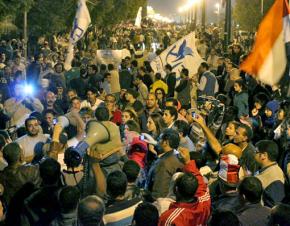Did Morsi overplay his hand?
An estimated 100,000 people filled Cairo's Tahrir Square November 27 to protest a decree by Egyptian President Mohamed Morsi that concentrates political power in his hands.
The mobilization was the latest in a series of protest around Egypt since Morsi made his move November 22. Morsi has fired Egypt's top prosecutor and barred judges from making any rulings on his decrees or legislation passed by the upper house of parliament. He has also banned the judiciary from ruling on the draft constitution drawn up by the Constituent Assembly, a body dominated by Islamists aligned with Morsi's Muslim Brotherhood and its political wing, the Freedom and Justice Party.
Mostafa Ali, a journalist and socialist in Cairo, spoke with about the dynamics of politics and protest in Egypt in the wake of Morsi's power grab.
THE EGYPTIAN military was the power behind Hosni Mubarak and the final authority in Egyptian politics. Has that changed now that Morsi has replaced former Field Marshal Mohamed Hussein Tantawi and other senior officers with a newer generation?
THE ARMY made it clear that it wants to remain neutral and will not interfere directly in political disputes. That might change as the result of street confrontations, which are leaving hundreds injured. The Muslim Brotherhood headquarters were attacked and burned by anti-Morsi protesters in Alexandria.
Also, the army generals who replaced Tantawi have a close relationship with the U.S. Morsi has not, and will not, challenge their economic power--at least yet--in order to keep them on his side.
IS THERE any connection between the rising level of strikes and discontent over incompetent state officials and opposition to Morsi's power grab?
YES, THERE are important strikes. There is a two-month-old national doctors' strike in public hospitals, which Morsi is ignoring. The Cairo subway workers struck to get the CEO removed and won in less than four hours in mid-November.

Then, on November 17, a train crashed into a school bus and killed 51 children. This created a momentous sense that all the Mubarak years of negligence and anti-poor policies are here to stay, just as the government signed an International Monetary Fund deal on austerity.
Along with strikes, there is opposition to the Constituent Assembly, which is preparing an anti-worker constitution that keeps the state out of the business of guaranteeing any and all social rights, such as health care and education. There is an anti-democratic draft constitution that tramples on basic freedoms. All this provided the background to the recent upsurge in protest.
HAVE FORMER regime elements--for example, the striking judges--tried to rehabilitate themselves as part of the secular opposition by joining the protests initiated by the left?
HAMDEEN SABAHI, who came in third in the presidential election, and the former diplomat Mohamed ElBaradei, are not leading the movement to the left. They have allied themselves with Amr Moussa, Mubarak's former minister of foreign affairs and a presidential candidate. These three figures are hoping to draw anti-Brotherhood crowds that had in the past supported Mubarak.
However, many voices in the mass rallies carry signs that read "No to the feloul," meaning no to the remnants of the regime. They physically chased Moussa and others out of rallies.
For its part, the Muslim Brotherhood accuses the opposition of making an alliance with the counterrevolutionaries. But the vast majority of people in the anti-Morsi protests are revolution supporters from Day One. In fact, the head of the Mubarak-era liberal Wafd party was smacked on the head at a Tahrir Square rally.
The question of the character of the opposition is a live debate. Many members of the Sabahi and ElBaradei camps are infuriated by their leaders' alliance with Moussa.
U.S. IMPERIALISM had to lean on Morsi for help in negotiating the cease-fire between Israel and Hamas in Gaza. Will this give him room to operate domestically as a result? What will be the impact of Egypt's deal with the International Monetary Fund (IMF)?
MORSI CAME out victorious and quite strong after the Gaza cease-fire. The right attacks him for putting Palestine and Hamas above Egypt, but he nonetheless achieved important political capital as someone who will stand up to Israel, unlike Mubarak. He squandered it in 48 hours by overplaying his hand and issuing a dictatorial constitutional declaration.
The government and the IMF want desperately to lift gas subsidies, but in this explosive, polarized atmosphere, they might delay that move indefinitely.
WHAT IS the strength of the Islamists?
THE SALAFISTS--the hard-line Islamists--and the Brotherhood have accused all who oppose any of Morsi's policies of being secularists and atheists. The Salafists have criticized Morsi from the right. But they have dropped that for now and mobilized to help the Brotherhood defend their headquarters against protests.
WHAT IS the perspective for the left in these new protests?
THE LEFT in Egypt is spread among a number of political parties. There are far left activists and revolutionaries in good numbers in the Popular Socialist Alliance Party. There are some leftists in Sabahi's Popular Current party as well as ElBaradei's Constitution Party, and in Abdel Moneim Aboul Fotouh's Strong Egypt party. The Revolutionary Socialists are still moderate in number, but have a large readership of its publications and strong name recognition.
The left is now coordinating through a front that includes members from some of these groups, hoping to draw the left of the ElBaradei and Sabahi groups--people who are repulsed by the idea of an alliance with the feloul. The focus of the front is to defeat Morsi's constitutional declaration and for a new, elected Constituent Assembly to write a different draft constitution--one that is pro-democracy and guarantees social justice.
In general, the mood on the left and among revolutionaries is upbeat. There is a new sense of confidence, militancy and hope unseen for over a year. The mass mobilizations against the Brotherhood were swift, and gave people a sense of new possibilities and that the Islamists are not invincible.


